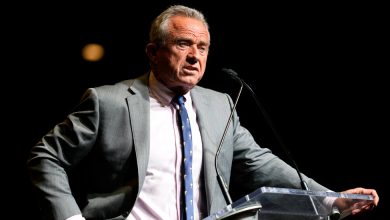The Hidden Moral Injury of ‘OK Boomer’

Mourners gathered around San Francisco City Hall this week to remember Senator Dianne Feinstein, one of the most formidable politicians of her generation. Her passing meant not just the end of her political career, but also the end of a furious argument over her age and condition. Why did she stay in the Senate for so long? And even so, as one argument ends, others continue: about Joe Biden, Mitch McConnell, Donald Trump and many others.
I can’t remember the last time our country had a longer or more agonizing conversation about age. It kicked off in the most morally troubling way possible, in the early days of the pandemic, when a number of politicians, celebrities and even ordinary people minimized the severity of the disease in language that diminished the value of older Americans.
Notoriously, in March 2020, Dan Patrick, the lieutenant governor of Texas, went on Tucker Carlson’s television show and suggested that senior citizens should be “willing to take a chance” on their survival to preserve the American economy. In New York, nursing home deaths were deliberately concealed, an act that publicly minimized the magnitude of the loss.
The right-wing influencer Candace Owens dismissed the seriousness of Covid, because, in her words, “people think it’s novel that 80 year olds are dying at a high rate from a flu.” I heard similar sentiments from members of my own community throughout the lockdowns. I can’t tell you how many times someone said, when an older person died, “How much time did they have left anyway?”
This debate unfolded as the term “OK Boomer” was taking off, both as a silly mockery of tech-ignorant grandparents and an angry battle cry against an older generation that younger Americans believe failed them. Worse still, they just won’t get out of the way.
It’s impossible to ignore the advanced age of key American leaders. Joe Biden is 80. Donald Trump is 77. Mitch McConnell is 81. Chuck Grassley is 90. Feinstein was 90 when she died in office. Ruth Bader Ginsburg was 87. Age was on 76-year-old Mitt Romney’s mind when he announced that he wouldn’t seek re-election to the Senate. “At the end of another term, I’d be in my mid-80s. Frankly, it’s time for a new generation of leaders,” he said.
I don’t equate all these situations. Some of the sentiments expressed at the start of the pandemic were monstrous. Concerns about aging and often infirm leaders at the highest levels of American politics, in all three branches of government, are far more understandable and much less grotesque than asking senior citizens to court death in the midst of a pandemic. The generational dismissiveness inherent in “OK Boomer” lies somewhere in between. Nonetheless, there is a common theme — a shift to viewing older people in America not as assets, but rather as obstacles. They’re barriers to our own dreams and ambitions.
One column is insufficient for teasing out all the reasons for this shift, but I want to explore one aspect that bothers me greatly. The centrality of work and career to our sense of self and identity — especially in America’s educated classes — is damaging old and young alike. In 2019, Derek Thompson popularized the term “workism” in The Atlantic to describe how our careers have “morphed into a religious identity.” Earlier this year, he summed up the “history of work” like this: “from jobs to careers to callings.”
In January, the Pew Research Center released a startling report describing parents’ priorities for their children. An extraordinary 88 percent said that financial independence was extremely or very important. The same percentage placed the same priority on their kids having careers they enjoy. In contrast, only 21 percent said it was extremely or very important for their children to get married. A mere 20 percent said it was extremely or very important for their kids to have children.
Workism tells older Americans who might think otherwise that their job is core to who they are. Likewise, workism tells younger Americans that their job will define them. It is core to who they’re becoming. Read in this way, it is easy to see why older Americans are reluctant to simply “step aside.” If they feel able — and it’s easier to feel able when your job centers on your mind rather than your body — then the demand to leave is an attack on their essential identity.
At the same time, for those who are seeking to forge their identity, the obstacle of aging leadership can be maddening. Young professionals do seek mentorship, of course, but all too often mentors are seen as valuable only so long as they keep giving. And then, when they’ve given all they can, they must decrease, so that their protégés can increase and take their place in the sun.
It’s necessary to think hard about our first answers to a deceptively simple question: “Who are you?” If my honest first response is “I am a columnist” more than a husband, a father, or a grandfather, then when I get older I will wrap my arms around that identity and refuse to let go. If that first answer is centered on faith and family, then the sunset of my career will not be the sunset of my purpose. I will be more willing to release that which I value less because I still preserve that which I value most.
But just as older Americans can have an obligation to let go of professions and power, young Americans can have obligations to hold on to their elders, to treasure them rather than shove them aside. Ancient wisdom can speak to modern conflicts, and ever since the onset of the generational conflicts during the pandemic, I’ve pondered a key part of the Westminster Larger Catechism, an almost 400-year-old statement of Protestant theology. It takes an expansive view of the Fifth Commandment, “Honor thy father and thy mother.” The catechism asserts that father and mother don’t merely refer to your biological parents, but to “all superiors in age and gifts.”
And what duties do we owe to the older people in our lives? The catechism outlines a beautiful balance. We are called to the “defense and maintenance of their persons and authority” at the same time that we are “bearing with their infirmities, and covering them in love.” In a true ethic of respect and care, the spirit of “OK Boomer” is nowhere to be found.
The Mitt Romney Christmas card is legendary in some niche circles in Washington. Every December, he sends out a simple picture of his growing family. You can Google it and see it expand, year by year. First, he and his five sons could field a Romney basketball team. Then, when the sons married and had children, they could field a Romney football team. But that picture is also a declaration — this is who I am.
Skeptics might claim that Romney let go of his power because holding it would be hard. In these polarized times, he was vulnerable to a challenge from the Utah right. Perhaps, but it’s also true that he retains immense purpose, and the picture captures that purpose. An ethos that locates our meaning in those relationships can tell the young to value the wisdom and experience of the old and tell our nation’s older generations that great blessings can flow from the end of even the most rewarding careers.
The Times is committed to publishing a diversity of letters to the editor. We’d like to hear what you think about this or any of our articles. Here are some tips. And here’s our email: [email protected].
Follow The New York Times Opinion section on Facebook, Twitter (@NYTopinion) and Instagram.




